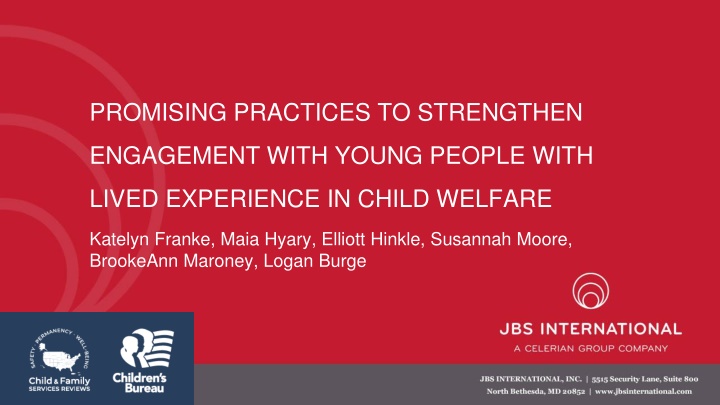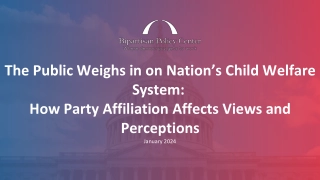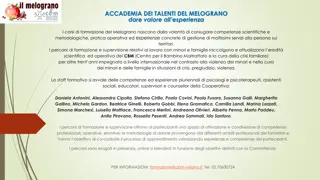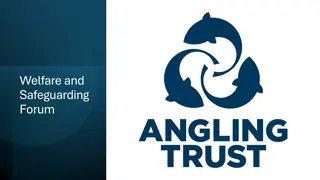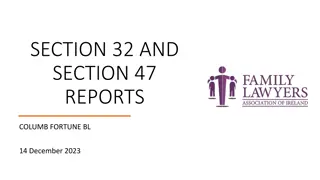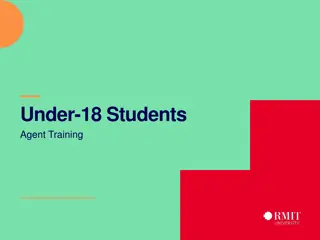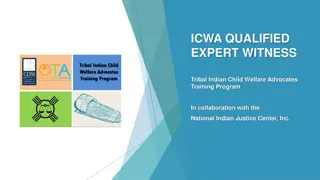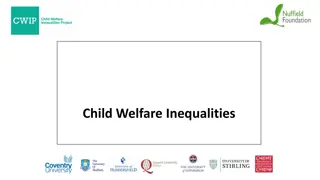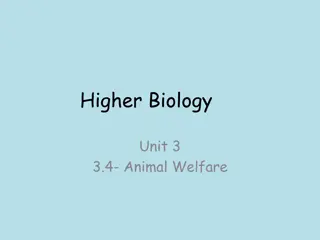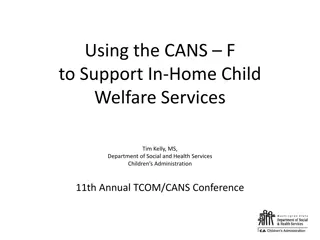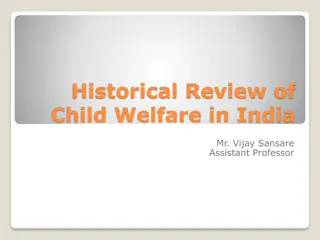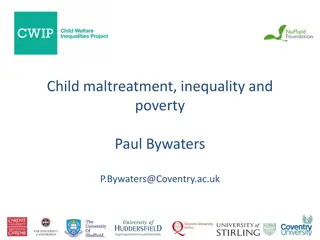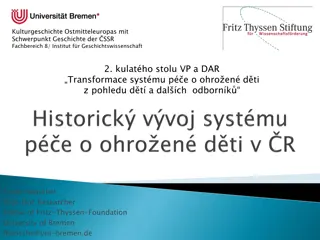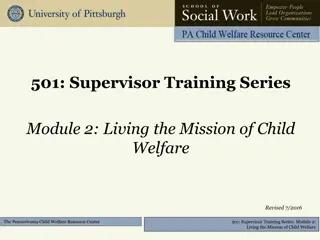Strengthening Engagement with Young People in Child Welfare
Promising practices to engage young individuals with lived experience in child welfare services are crucial for improving outcomes. Through activities, projects, and key considerations, this initiative aims to enhance involvement, advocacy, and partnership with these individuals. Strategies include early engagement, diversity, and authentic partnerships based on insights from lived experience experts.
Download Presentation

Please find below an Image/Link to download the presentation.
The content on the website is provided AS IS for your information and personal use only. It may not be sold, licensed, or shared on other websites without obtaining consent from the author.If you encounter any issues during the download, it is possible that the publisher has removed the file from their server.
You are allowed to download the files provided on this website for personal or commercial use, subject to the condition that they are used lawfully. All files are the property of their respective owners.
The content on the website is provided AS IS for your information and personal use only. It may not be sold, licensed, or shared on other websites without obtaining consent from the author.
E N D
Presentation Transcript
PROMISING PRACTICES TO STRENGTHEN ENGAGEMENT WITH YOUNG PEOPLE WITH LIVED EXPERIENCE IN CHILD WELFARE Katelyn Franke, Maia Hyary, Elliott Hinkle, Susannah Moore, BrookeAnn Maroney, Logan Burge
Agenda Introductions Background Activity Project results Key considerations Roles Activity Recommendations Activity Lessons learned Activity Conclusion Q&A Sign-off and send recommendations to HR
Background One of the ways in which the Children s Bureau (CB) helps states achieve positive outcomes for children and families is by monitoring state child welfare services. Young people with lived child welfare experience are important partners when monitoring state child welfare services (e.g., through the Child and Family Services Reviews (CFSRs)). Young people with lived experience often understand how the system works (or doesn t work) and have ideas about how to improve it because they have experienced the child welfare system first-hand.
Activity 1: Polling Question 1: How many years have you been engaging young people in your work? Scale with range Question 2: Do you feel you are doing well at engaging young people with lived experience in your work? No Somewhat Yes Question 3: Do you feel prepared to advocate for engaging young people with lived experience? No Somewhat Yes Think-Pair-Share Why would you like to include young people with lived experience in your work, project, or team?
Our Project Orientation, Preparation, and Focus Group Sessions were held in January and February 2022. The project consisted of 8 focus groups with 18 lived-experience experts. Lived-Experience Expert Consultants referred to as coaches helped develop all materials and co-facilitated each session. Set 1 9 lived-experience experts with experience partnering with federal staff on monitoring efforts Sample 18 young people with lived experience Set 2 9 lived-experience expertswithout experience partnering with federal staff on monitoring efforts
Project Results: Key Considerations Young people with lived experience provided consistent answers across all 8 focus groups. Results from our project demonstrate that young people want to be engaged in all aspects of the CFSRs. Key considerations for engagement include: Intentionality, authenticity, and equal partnership Early and ongoing engagement Diversity, equity, and inclusion [T]he federal government needs to know that we want to do it. We know the ins and outs of it. Let s get people who ve actually experienced the system in charge of changing the system. -Focus group participant/lived experience expert
Project Results: Roles Providing training Providing training to interviewers on to interviewers on how to speak how to speak with with young people young people in care regarding in care regarding their experiences their experiences Helping to develop Helping to develop training materials that training materials that are are young young- -people people- -friendly and young and young- -people sensitive sensitive Helping to gather Helping to gather data and evidence data and evidence (e.g., from (e.g., from young people in care) young people in care) Reviewing data and Reviewing data and identifying themes identifying themes friendly people- - Working with the state Working with the state to determine whether to determine whether strategies and activities strategies and activities are making a positive are making a positive difference difference Designing engaging Designing engaging visuals to present data visuals to present data using language for the using language for the general population general population Gathering information Gathering information from young people in from young people in care about what is and care about what is and is not working well is not working well Supporting states with Supporting states with outreach to provide outreach to provide more diverse voices more diverse voices
Activity 2: Word Cloud When considering roles for people with lived experience in child welfare work, what roles have you seen, or would you like to add?
Project Results: Recommendations Prepare, support, and train young people Provide clear expectations to help young people understand the purpose of their involvement Create a safe and supportive environment Provide hands-on training before all opportunities Allow young people to train other young people Provide young-people-friendly data visualizations and materials Invite young people take part in data collection Encourage young people to help create materials/resources Develop engaging briefs and summaries for a non-technical audience (e.g., young people with lived experience)
Project Results: Recommendations continued Offer young people with lived experience employment and leadership opportunities in child welfare work Offer entry-level roles Establish appropriate compensation before opportunities are presented Jurisdictions can throw out $15 or gift cards as a seemingly good start but $50 minimum is my number. Compensation policies should be set prior to the start of engagement. Figure out if there are any federal pipelines for funds and if it comes from the state, then knowing what the decision-making process/avenues of funds (i.e., Chafee dollars, CFSR dollars) [are] to get there. -Focus group participant/lived experience expert
Project Results: Recommendations continued Provide young people with ongoing engagement, outreach, and recruitment opportunities Ensure young people receive results and products that stem from their involvement Advertise opportunities in places where young people are Use various methods to contact young people Partner with peer networks and those who have relationships with young people Recruiting young people for one-time things [engagement opportunities] is great. But I think maintaining the relationship with youth throughout, not even just throughout a particular project, but throughout the duration of the whole time it takes to improve the child welfare system can be a benefit to the states. Engage more than one young person for diverse perspectives Include multiple young people to prevent tokenization Use peer networks to recruit, train, and retain young people Create opportunities for young people to build a sense of community and peer-to-peer connections -Focus group participant/lived experience expert
Activity 3: Talking Wall Pause and consider the why that drives you: check in with yourself and ask if engaging a lived experience expert is simply to mark a checkbox or if its purpose goes beyond that. How might you provide lived- experience experts with the agency and power to authentically participate? How might you ensure that lived-experience experts have a say in the work throughout the course of a project? What is it that you want to achieve when including lived- experience experts?
Lessons learned when advocating for the importance of establishing young people with lived expertise as experts Plan ahead Plan ahead and be flexible and be flexible Engage early Engage early and and continuously continuously Build rapport Build rapport Solicit and Solicit and respond to respond to feedback feedback Use technology Use technology to your to your advantage advantage
Lessons learned continued Be ethical Be ethical Show respect Show respect Always keep Always keep learning learning Be supportive Be supportive
Activity 4: This or That This That Provide hands-on preparation before an engagement opportunity. Email a 10-minute summary of the engagement opportunity the same day. Ensure that young people receive results or products that stem from their involvement. Post a brief thank-you for involvement without closing the feedback loop. Provide cash as compensation for engagement Provide gift cards that are easily redeemable at most retailors as compensation for engagement Most young people who were asked say they wish to have involvement in all aspects of child welfare work, therefore, plan for involvement at all ages, stages, and phases of child welfare work. Ask people for permission before you begin recording Most young people who were asked say they do not wish to have much involvement in child welfare work, therefore, plan for minimal engagement. Start recording a Teams meeting as soon as the meeting starts
Conclusion The engagement of young people should occur across all: Stages: Engage young people in care and young people who are no longer in care Ages: Engage young people as early as possible I think bringing our own stories and knowledge to the table would be very beneficial to help states... Focus group participant/lived experience expert Phases: Engage young people in all parts of your work; beginning to end
